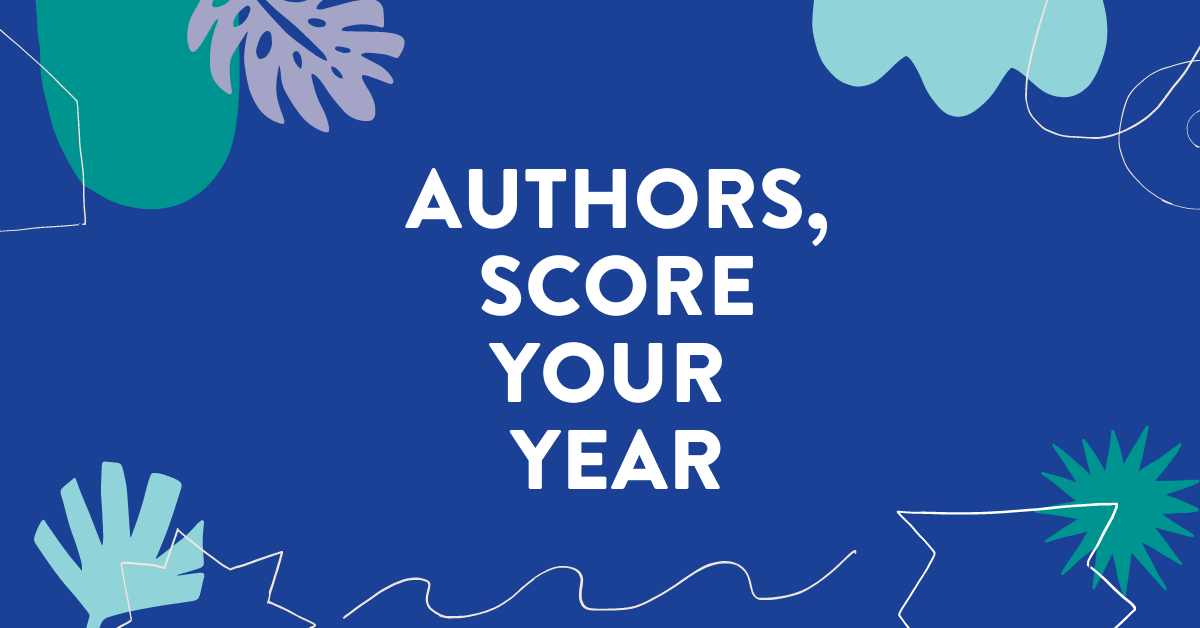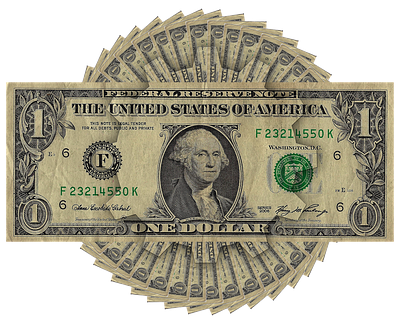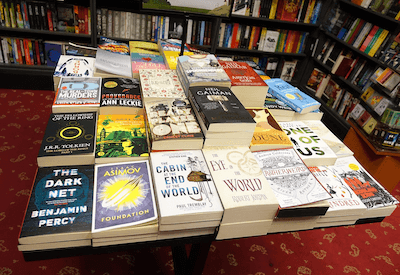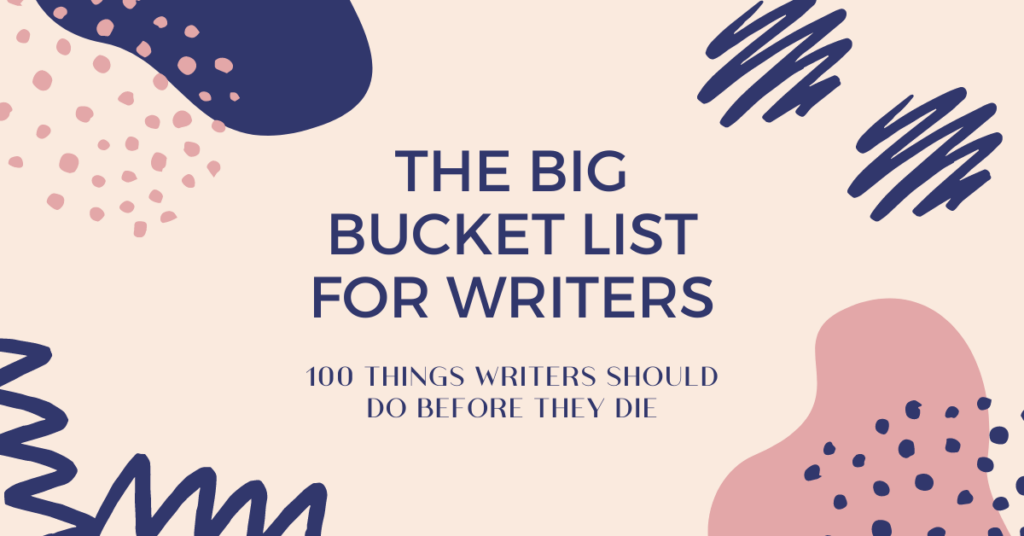 As the year draws to a close, it’s time for writers to do some self-examination.
As the year draws to a close, it’s time for writers to do some self-examination.
You probably already have a sense whether this was a banner year for you or a real stinker, but you need to think about WHY.
What made this a horrible year for writing or your most successful year ever? And how can you continue your streak or even do better next year?
It’s good to be reflective about our writing life because it’s easy to fall into ruts. I know. I’ve fallen into many ruts over the course of my writing career:
- Writing the same genre for too long.
- Focused on seeking approval from academia.
- Not writing enough.
By answering the 12 questions below, you’ll be able to diagnosis your writing roadblocks, and figure out how to break out of ruts (or how to keep your streak going).
These questions will help you score your writing life for the year.
1. What was the best risk you took as a writer last year?
 There are two errors on this spectrum: one would be never taking any risk as a writer (writing safe, commercially friendly material, for instance), and the opposite would be taking too much risk (quitting your job to write full time — although maybe that could be the right path for some people).
There are two errors on this spectrum: one would be never taking any risk as a writer (writing safe, commercially friendly material, for instance), and the opposite would be taking too much risk (quitting your job to write full time — although maybe that could be the right path for some people).
Overall, though, when I counsel writers, I often find they’re not taking enough risk.
By risk I’m talking about attempting a book which might be currently beyond your abilities as a writer, or striking out into a new genre, or joining a new writing group, or attempting to read double the amount of books as last year, or starting a book club, or writing an open letter to an author you despise or adore.
Identity what risks you took last year, and then look forward — how you can be even riskier in the new year?
2. What was the best dollar you spent on writing this year?
 Did you go to a conference? Pony up for an editor? Hire a nanny? Maybe you did something that didn’t require very much money at all, but it was the best money you’ve ever spent on writing (carpal-tunnel wrist protector).
Did you go to a conference? Pony up for an editor? Hire a nanny? Maybe you did something that didn’t require very much money at all, but it was the best money you’ve ever spent on writing (carpal-tunnel wrist protector).
So how can you use money more effectively next year to become a better writer? Come up with a list of three ideas.
And … if you didn’t spend any money at all on writing, maybe you have to ask yourself whether it’s really a priority in your life.
3. When did you spend your time wisely this past year?
Was there a particular month when you got a lot of writing done? What did you do differently that month? Can you replicate that?
You can also think of the opposite of this question: when did you squander your time this year? Did you get too addicted to video games or social media or a television series? How did that hamstring your writing?
4. How did you develop friendships with other writers last year?
 If you aren’t actively developing friendships with fellow writers, your writing life will end up in shambles.
If you aren’t actively developing friendships with fellow writers, your writing life will end up in shambles.
Name any new writing friendships you’ve started. And name writing friendships you’ve deepened.
Now: write them an email right now to tell them that you love them and appreciate them and they’re a freaking genius-level writer and you would end up a hack if it wasn’t for their wisdom and encouragement.
And figure out how to connect with more writing friends next year.
5. What did you do last year that you need to stop?
Every writer needs to stop something.
Maybe you need to stop comparing yourself to others. Maybe you need to stop being so jealous of the six-figure advance a writing friend received. Maybe you need to stop surfing the internet during your writing time.
Maybe you need to stop the voice inside your head that tells you that you’re a terrible writer.
Whatever is it, name the thing that you did last year as a writer that you need to quit, right now. Name it and swear that you’re going to put a dollar in the Mistake Jar every time you do it next year.
6. What was the best advice you received about writing this year?
Maybe you read a book, or heard a quote, and it’s really stuck with you this year. If so, make sure to trumpet it on social media and post it above your workspace.
Even more important, ask whether you’ve truly incorporated that advice into your life, or whether it’s still a cerebral thing. Knowledge alone doesn’t help you become a better writer; you’ve got to have action.
7. What was your biggest writing success?
 Take a moment and write down your biggest writing success — or better yet, your top three or top five successes. The discipline of steady writing? Setting up a writing workshop of friends? A big publication?
Take a moment and write down your biggest writing success — or better yet, your top three or top five successes. The discipline of steady writing? Setting up a writing workshop of friends? A big publication?
Do you want to have the same kind of writing success next year, or are you looking to excel in a different way? Sometimes it can be too easy to keep focusing on your strengths rather than attempting to improve your weaknesses. To challenge yourself, seek success in a new area for the new year.
8. What was your biggest writing failure?
Where did you fail as a writer, and why? What will you change for the next year to make sure that doesn’t happen again? Do you want to keep plugging away at the same mission, or should you pivot and try another genre or a different approach?
Acknowledging your writing failures goes a long way toward figuring out how to beat them. Every writer fails. Hell, we fail a lot. But make your failures count by learning from them. You can’t learn from them if you don’t think about what made them happen and come up with a new approach for next time.
9. What was your most pleasurable reading experience this year?
 Was it very similar to what you write or very different? If it was very different, do you want to change tack and try writing in that new genre?
Was it very similar to what you write or very different? If it was very different, do you want to change tack and try writing in that new genre?
What can you learn from your most pleasurable reading experience? How did the author accomplish that magic?
Here’s a trick: when you’re finding it difficult to summon up energy to write, lie back for a second and remember the emotions you felt during that pleasurable reading experience. Think about what happened to you. Now think about how you want to do that to others with your book. Now go — write!
10. Your worst reading experience this year?
It’s very important to read bad books. I do so regularly. Most of the time, it’s not on purpose. But bad books are very instructive — if you know exactly what makes them bad, you can learn from their errors.
Name the book that made you grimace, howl, and shake your head. For me it was a Billy Collins collection of poetry. I was astonished at how bad it was, like someone trying to imitate all the worst poetic cliches. But I’m still grateful for the experience of learning and articulating exactly what I love and hate about the art of language.
11. When did you have the most fun as a writer this year?
 If you thought of sitting alone at your desk, wonderful! Or if you thought of a conference or receiving an acceptance letter, that’s great too.
If you thought of sitting alone at your desk, wonderful! Or if you thought of a conference or receiving an acceptance letter, that’s great too.
It’s important to identify how you experience joy as a writer so you can structure your writing life to have more experiences like those.
After all, you can’t create a writing life on the shaky foundation of misery and putting your head down and barreling through. This is art! It’s supposed to be fun! Don’t buy into the myth of the depressed writer — the joyful writer will produce more and better work.
12. What did you learn about yourself as a writer last year?
Self-knowledge is so critical in the writing life. For instance, I learned that even though I love to read poetry, I am by no means a poet. I’m going to stick with writing fiction.
It’s important to know your strengths, right?
And if you keep a list of what you’re learning about yourself as a writer, your strengths and weaknesses, your superpowers and Kryptonite, you’ll be able to look back years later and see a ladder of how you were refining your writing to take fullest advantage of your strengths.
#
Please comment below with the answers to one or two questions (or if you want to be an over-achiever, all 12 questions!)
I hope that was a helpful way to review your Writing Life this year! May you have a clearer vision of what you did well last year and what you can improve on for next year.


38 comments
Well last year….I participated in various competitions but could grab nothing.
I do tried taking risks by going out of my kind of genres and adding up comical components to some of my slam poems.
I do have writer friends. I try anonymous people to read my piece but since a few months (as soon as I entered in MBBS course), I am making blunders and reduced my editing time because of heavy studies.
Have been in depression since a few months back so preferably the same genre spills out.
Thanks for sharing! Good luck for a better 2019.
(To John: I know this is your site, but I would like to be allow to say this if you see fit)
Hi Kartik,
I read your comment a few times and thought of it.
I am no psychologist but I would like to say this:
Please don’t give up and don’t let your failures deter you. I read years ago that a writer (I’m so sorry can’t recall his name now) had 199 rejections. As a fun thing he said to himself:”Well let me make it a square number.” and sunmitted it again. The book became a best seller.
About your depression? What opportunity! If it is not too bad, could you treat it as some separate freak personality and start a dialogue (in writing) with it? I had problems with depression in the past until I decided to treat it as a separated identidty (in this case a bad one) from me.Everyone is different. It worked for me, but may not work for you. So please, even if you want to try this, keep in touch with your doctor.
Good writing.
Great questions. The biggest risk I took was to self publish my first novel. It’s been the most fun, the most frustrating, the most educational, the most inspiring thing I’ve ever done. It was a biggie.
Yes, absolutely that’s a risk. And congrats!
One more question (perhaps a subset of #4): What did you do to help other writers this year?
Oh, Ann, I love that!
I’ve been in a writing funk all year. I don’t want to make excuses, but I guess it all started when my Mom died right after Thanksgiving last year. Haven’t completed a story this year other than my blogs, and that’s flash fiction. I was publish this year. I also had bookmarks printed up. One thing I need to stop is procrastinating.
Hi James, sorry to hear that. I don’t think you’re making excuses, I think you’re just struggling to deal with some stuff. I hope you can process your emotions and sort things out and get back to writing in the new year.
John,
The best advice I got on writing this year was from you when I sent you my manuscript. I am still working on your suggested revisions, in between my teaching duties, and hope to have you look at it again on the coming months. Thanks so much!
Hi Kevin, really appreciate that! Good luck with revisions and I’ll be here when you need me.
Thank you for your website and tips, John. They were one of the highlights for me that I shared with a little writing group.
All the best for a Happy Christmas & successful 2019.
Thanks for sharing! Merry Christmas to you as well and I hope your 2019 is even better than this year too.
Yeah. It’s good
Great questions! In answer to #4, I focused on connecting via local conferences in my state as well as online through twitter, Facebook, and blogs, in 2018. I also found a local writing group.
Glad you were able to connect!
The best $$ I spent on writing was $140 for an intimate (10-12 people) for a 2 day writing workshop this weekend facilitated by Pamela Des-Barres. She’s a renowned groupie legend who wrote ‘I’m With the Band’ and several other books about her experiences hobnobbing with rock’n’roll bands. Taking this course will help me with writing my own memoir about similar experiences during my late teen and early 20’s. Meeting Pamela is one of my ‘bucket list’ to do’s and that will happen this weekend.
One thing I learned about myself as a writer is that ‘writer’s block’ is a real affliction and not another procrastination excuse. At least, for me. When my younger sister died on July 11th, it was so devastating that I became ‘stuck’ and have been ever since. I believe this workshop with Pamela is going to recharge the writer right back into me!
Well, that workshop sounds great, and I hope you get unstuck. Good luck with the memoir!
The biggest risk I took was including information about myself. My editor strongly suggested that I add information to the book that explained how I became who I am today. I was reluctant however I finally took it upon myself to do and it helped me realize more about me than I thought I knew.
Yes, the memoir form requires you to be really vulnerable. It can be painful to write about and to reveal.
The best thing I did is when my poems got published. Also, everyone in my story group ended up in the newspaper, and all our stories were published.
Best Risk: Believed John Fox would help my story.
Best Money Spent: Invested $1,000 for a professional Editor’s advice.
Time Spent Wisely: Due to disabilities that make mornings especially difficult, I devote my mornings to writing and illustrations for the book.
Spending Time with others: Not possible for me.
The best and only advise I received last year was from John Fox.
Best success was taking the advice given to me and quickly turning it into a story I believe in.
My biggest writing failure was continuing to work on the original story. I knew it wasn’t right, but didn’t know why, so, I kept trying to make it work.
Best Read: James Herriot – All Things Great and Small
Worst Read: Just about any text message or posting on-line makes me cringe.
Most Fun: The couple of weeks after receiving good advice from John Fox. The story came alive in my mind.
What I learned: It takes a lot of research to find a good Editor.
Thanks Kathleen! Glad I could be helpful!
Thanks for sharing. The questions are inspiring.
Friendships – joining the writers group for our weekly meetings and making friends. We share so much, it’s become a very important and enriching part of my life.
Worst reading expereince
current book I am reading, the first 40% of the book, the plot is very unclear, the story settles down at the 60% mark.
Hmmm! I don’t even feel alright to address myself as a writer. After many failures to get an agent, I am a kind of given up but the passion to write always bubble in spirit. I wish I could be connected to any writing group that can help stir up my writing. I really want to write professionally. John fox, u are doing a great job. Please don’t hesitate to offer help in any area u think I need assistance base on your experience. Thanks.
Writers are people who write, not people who land an agent. Use Meetup or Facebook groups to find a writing community, and read this longer post on how to build a writing community.
What an excellent set of questions! I’ve copied them out and I plan to give myself time to tackle each one. Already the answers are helping me introspect and understand what I’ve done well and the areas I desperately need to improve. Thank you for this and all the great tips you share!
The problem here resides in your point #2….”if you didn’t spend any money at all on writing, maybe you have to ask yourself whether it’s really a priority in your life.”…I live for writing, but if you have less than a $100 dollars a month to spend on food, one lives no better than an artist would have in the 1920’s living in Paris. Life is not equal when living in a third world country. The first world seems so far away and all I have is my writing. My latest novella is about Love and Paradox and I hope to finish it before the end of 2018. I have gathered a lot of wealth from your support and guidance, trying to understand ‘the secret society of publishing’ ; the “We regret to inform you people”…but you have introduced me to the reality of living in the 21st century since I first subscribed to your site. And for that, I am entirely grateful. Writing is a journey and who knows what lies at the end of the road.
Hi Peter-John, Certainly agree that some people’s financial situations make spending money impossible. Hey, I’ve been there. But I feel like the majority of writers could be wiser about spending the money to go to a weekend conference or buying some books on writing.
Good luck with the novella! And glad you’ve found Bookfox useful.
Totally agree with Peter-John Calitz. When you live in the third world, the first world seems so far away. And sometimes its concerns seem so frivolous. But I did spend money on my writing. I bought some books that are part of what I think is background reading for my novel-in-progress. I had to buy them since they were not available in my local library. The biggest risk I took was to quit my job to write full time. But I’m really happy I did that. It was not an impulsive decision but one I had thought about for years. I had some success in writing this year. My novel has made great progress. I translated a script from the local language into English.
John, your blog is great. Thanks a lot.
Best Reading Experience…
Beleve it or not, it was reading the ending of Agatha Christie’s, “Murder in Mesopotamia.” She absolutely floored me! Her writing, there, was so beautifully tender–really exquisite. Yes, really! Of course, to get to the ending you have to read the rest of the book first… But the ending could not have the impact it does if it is taken out of context. (And perhaps it was so moving to me because I read it, of course, with the background of my own life as context.)
This year positive: I got a book published and got one poem in an Anthology. I held my book launching which was a fascinating experience. For a moment I felt like a real writer…
I attended to three book launchings of other authors as well.
I attended two writing seminars.
I read a few books…but too few.
In the sequence of my book launching and my poem in the anthology I made contact with a number of writers/poets. From these contacts I had an offer to co-edit (more likely rewrite) a new edition (3rd editition) of a book by a Professor theologian, on ‘Diasporas’.(Expats).
Money spent? More than I could afford, but it was several thousand dollars all added up.
What could I have done better? (apart from everything?)
Write more.
Translated my work in at least one or two different languages, especially spanish.
Finish or at least could have done more work on another book I am writing. Well in fact I am working on another two books (may look pretencious, but it is the inability to start and finish one.) The book published in March, was all work of previous years.
Should have read more books, but I am so busy and sometimes tired, so it becomes hard.(excuses!!)
Plans for 2019?
Be more methodic.
Finish at least one more book, ideally two.
Translate my book into Spanish.
Start a ‘serious’ writers group.
(Planned but embrionic) Start teaching poetry to beginners. But that is not a priority.
Was this good enough? My excuses are (losers have always excuses) that I work part-time (didn’t quit my job yet…) and study
***
Acknowledgement/Appreciation.
I want to thank John for going to the trouble to giving us so much FREE advice. It can be argued that he his promoting himself so he can sell some of his products. That may be so, but I believe that he still is giving more than he is receiving.
So I want to leave here my gratitude and I started giving advice for free (when appropriate) to put back into the community of writers what I am getting. I also passed his contact to some friends.
I wish I could buy some of the great product John is offering, especially the editing, but unfortunately I am still finishing my BA Creative Writing, and with all the expenses I can’t afford now any much more than my food. Especially with the credit cards from last year.
Hope I have answered some of the 12 points. 🙂
Best Regards and a well written NEW YEAR of 2019
Sid.
I bought a laptop. I also entered a writing competition. I lost, but it was worth a try and I hadn’t done that for several years. I’m going to put myself out there more as a writer.
These are great questions and, along with the comments, are stimulating me to think about my year. I did NaPoWriMo, which was a really good exercise. Went on to submit some poems, which went nowhere. Self-published a chapbook in electronic format, got more positive attention than I expected (i.e, slightly more than none). I intend to publish a print version this year and get it into some stores. Read at an open mic. So I took some risks, spent a little but not much, put myself out there a bit.
My writing in a prose genre appears to be fizzling, I don’t know why.
Novel in progress did not progress this year. It’s the most similar to the most exciting reading I did this year, “Daughter of the Burning City” and “The Night Circus,” both beautiful fantastical novels. I think it has to do with feeling I can sit down for hours, several days/week, and focus on the book. I’ll be moving house this year, need to get more paying work, etc, and always feel I have obligations that are higher priority. But I can write a poem in an hour . . .
I tried my hand at NaNoWriMo. It helped me to start setting a word count per day in order to push myself.
I guess there are two approaches: think commercially by choosing a genre and researching all the tips for sticking to a formula; or write for yourself, resigned to the fact that it may not appeal to a wider audience, but you have the satisfaction of fulfilling a goal. Whatever the approach, don’t procrastinate. Without something on paper, your imagination is imprisoned within your mind.
I think it’s reasonable to summarize these things every year. 2020 was productive for me, I think. I tried my hand at NaNoWriMo for the first time and also had a lot of interaction with aspiring authors and successful commercial writers, exchanging tips and notes.
I won’t bore you with answers to all 12 questions, I think, but I’ll definitely make such an entry in my journal. Makes me think.